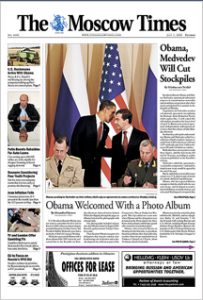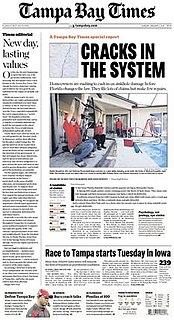The St. Petersburg Times may refer to the following:
- The St. Petersburg Times (Russia), a former Russian newspaper
- The St. Petersburg Times , former name of the Tampa Bay Times, an American newspaper
The St. Petersburg Times may refer to the following:

The Moscow Times (TMT) is an independent English-language and Russian-language online newspaper. It was in print in Russia from 1992 until 2017 and was distributed free of charge at places frequented by English-speaking tourists and expatriates such as hotels, cafés, embassies, and airlines, and also by subscription. The newspaper was popular among foreign citizens residing in Moscow and English-speaking Russians. In November 2015 the newspaper changed its design and type from daily to weekly and increased the number of pages to 24. It became online-only in July 2017.

Football Club Zenit, also known as Zenit Saint Petersburg or simply Zenit, is a Russian professional football club based in Saint Petersburg. Founded in 1925, the club plays in the Russian Premier League. Zenit are the reigning champions of the Russian Premier League. Previously they won the 2007, 2010, 2011–12, 2014–15, 2018–19, 2019–20 and the 2020–21 seasons of the Russian Premier League, as well as the 2007–08 UEFA Cup and the 2008 UEFA Super Cup. The club is owned and sponsored by the Russian state-owned energy giant Gazprom. The team play its home matches at the Gazprom Arena. In March 2022, the club was expelled from all European and international club competitions by FIFA and the UEFA due to the 2022 Russian invasion of Ukraine. In addition, the European Club Association suspended the team.

The Tampa Bay Times, previously named the St. Petersburg Times until 2011, is an American newspaper published in St. Petersburg, Florida, United States. It has won thirteen Pulitzer Prizes since 1964, and in 2009, won two in a single year for the first time in its history, one of which was for its PolitiFact project. It is published by the Times Publishing Company, which is owned by The Poynter Institute for Media Studies, a nonprofit journalism school directly adjacent to the University of South Florida St. Petersburg campus.
Novye Izvestia is an online newspaper, published in Moscow, Russia. Until 2016, it also published a print edition.

Lyudmila Aleksandrovna Ocheretnaya is the former wife of Vladimir Putin, who is the current president and former prime minister of Russia.

The Tampa Tribune was a daily newspaper published in Tampa, Florida. Along with the competing Tampa Bay Times, the Tampa Tribune was one of two major newspapers published in the Tampa Bay area.

The 2006 Florida gubernatorial election took place on November 7, 2006. Incumbent Republican Governor Jeb Bush was term-limited, and could not run for reelection to a third consecutive term. The election was won by then Republican Charlie Crist, the state's Attorney General. The election was notable in that for the first time, the state elected a Republican governor in three consecutive elections.
The Citizen may refer to:

Vasilyevsky Island is an island in St. Petersburg, Russia, bordered by the Bolshaya Neva and Malaya Neva Rivers in the south and northeast, and by Neva Bay of the Gulf of Finland in the west. Vasilyevsky Island is separated from Dekabristov Island by the Smolenka River. Together they form the territory of Vasileostrovsky District, an administrative division of Saint Petersburg.
The St. Petersburg Times was a weekly newspaper issued in St. Petersburg, Russia. It served the expatriate community, tourists, and Russians interested in an international perspective on local and world affairs. Publication began in May 1993, and was suspended on 24 December 2014. The editorial staff tweeted that the situation was connected with the economic crisis in Russia and current legislative environment.
Golos may refer to:

The Vedomosti was the first newspaper printed in Russia. It was established by Peter the Great's ukase dated 16 December 1702. The first issue appeared on 2 January 1703.
Gordon Harold Jago is an English former football player and manager, and the former director of the Dr. Pepper Dallas Cup international youth tournament.
Krasnogvardeysky (masculine), Krasnogvardeyskaya (feminine), or Krasnogvardeyskoye (neuter) is something named after the Red Guards. It may refer to:

The Dissenters' March was a series of Russian opposition protests that took place on December 16, 2006 in Moscow, on March 3, 2007 in Saint Petersburg, on March 24 in Nizhny Novgorod, on April 14 for the second time in Moscow, on April 15 again in Saint Petersburg, on May 18 in Samara, and on May 19 in Chelyabinsk. Some of them were featured in various media outlets.

GoRail is a rail freight operator in Estonia, and also offers related training services. Until commencing offering freight services in 2019 it was a passenger service operator, and until 2020 it operated the only direct international passenger rail services from Estonia.

Saint Petersburg, formerly known as Petrograd (1914–1924) and later Leningrad (1924–1991), is the second-largest city in Russia. It is situated on the Neva River, at the head of the Gulf of Finland on the Baltic Sea, with a population of roughly 5.4 million residents. Saint Petersburg is the fourth-most populous city in Europe, the most populous city on the Baltic Sea, as well as the world's northernmost city with over 1 million residents. As Russia's Imperial capital, and a historically strategic port, it is governed as a federal city.
Pravda is a Russian broadsheet newspaper, formerly the official newspaper of the Communist Party of the Soviet Union, when it was one of the most influential papers in the country with a circulation of 11 million. The newspaper began publication on 5 May 1912 in the Russian Empire, but was already extant abroad in January 1911. It emerged as a leading newspaper of the Soviet Union after the October Revolution. The newspaper was an organ of the Central Committee of the CPSU between 1912 and 1991.

The Fabergé Museum in Saint Petersburg is a privately owned museum in Saint Petersburg, Russia. It was established by Viktor Vekselberg and his Link of Times foundation in order to repatriate lost cultural valuables to Russia. The museum is located in central Saint Petersburg at the Naryshkin-Shuvalov Palace on the Fontanka River. The museum's collection contains more than 4,000 works of decorative applied and fine arts, including gold and silver items, paintings, porcelain and bronze. A highlight of the museum's collection is the group of nine Imperial Easter eggs created by Fabergé for the last two Russian Tsars.
The "Russian world" is the concept of social totality associated with Russian culture.